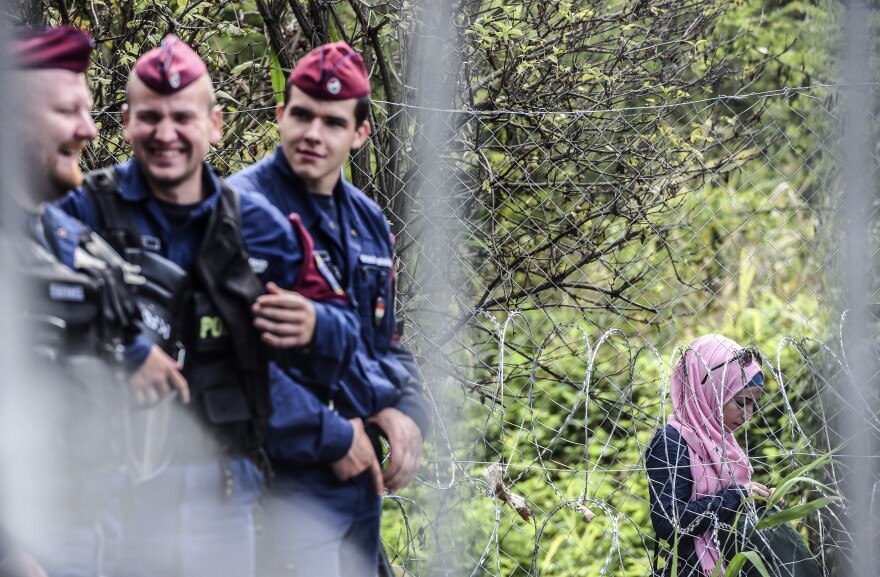With Hungary's southern border now sealed, many refugees and other migrants are looking for other ways to reach refuge in northern Europe — and they hope to find an answer in a tricky route through Croatia.
Update at 1 p.m. ET: Tear Gas And Water Cannons At Hungary's Border
With thousands of migrants now bottled up in Serbia after Hungary sealed its border, a tense scene played out after frustrations boiled over Wednesday.
From the border, Lauren Frayer reports for our Newscast unit:
"It started with hundreds of migrants and refugees pressed up against a fence on the Serbian side of the border. They tossed plastic bottles at police out of frustration that Hungary has closed this frontier. People can only request asylum at official gates now.
"Women and children edged to the front of the crowd, some holding up babies in an appeal for mercy.
"Then some young men broke through the razor wire. Hungarian police responded with tear gas and water cannons, fired over the border into Serbia — triggering a panicked stampede. Hundreds of people retreated farther back into Serbia, rubbing their eyes from pepper spray."

Our original post continues:
Hundreds of people who were caught on the Serbian side of Hungary's border when the border was sealed Tuesday are sleeping out in the open, on highways and elsewhere. Many of those who get past Hungary's border fence are being arrested. And now some are heading to Croatia, which has said it's willing to grant them passage to neighboring countries.
From Szeged, on the Hungarian side of the border, Lauren Frayer reports for our Newscast unit:
"Police block journalists from talking to refugees arrested at the side of the road in Hungary. They could go to prison for 3 years, for hopping over a barbed-wire fence from Serbia.
"These officers are with Frontex, the European Union's border control agency, here to assist Hungary in sealing its border.
"Migrants and refugees who can no longer enter the EU here are looking for alternate routes — through Romania or Croatia. But Hungary has said it'll build another fence on its Romanian border. And there are land mines — left over from the Balkan wars — on Serbia's frontier with Croatia."
More than half of the more than 400,000 migrants who have entered the European Union this year are refugees who are fleeing Syria's civil war, according to the UN Refugee Agency.
They're aiming to reach the Schengen zone, Europe's border-free area, where they hope to find safety and stability after enduring months of violence at home and uncertainty on the road to Europe.
On Wednesday, the first group of "about 150" migrants reached Croatia, the BBC reports.
From Vienna, Kerry Skyring reports on the new route:
"After Croatia, their next destination will be Slovenia which is part of the Schengen zone.
"This new route is a challenging one. The Danube River forms much of the border between Serbia and Croatia — part of it still dangerous with land mines from the Yugoslav war. Added to this, high mountain ranges will have to be crossed in Slovenia."
The large influx of migrants across borders has led some countries to adjust their policies. To the west of Hungary, Austria announced emergency actions that take effect Wednesday, seeking to place more formal controls on its border with Hungary. The country also said the tightened rules could be installed elsewhere, if needed.
Copyright 2021 NPR. To see more, visit https://www.npr.org. 9(MDAxODc1NzUzMDEyMTgyMjc0NzUxZmVhMQ004))


